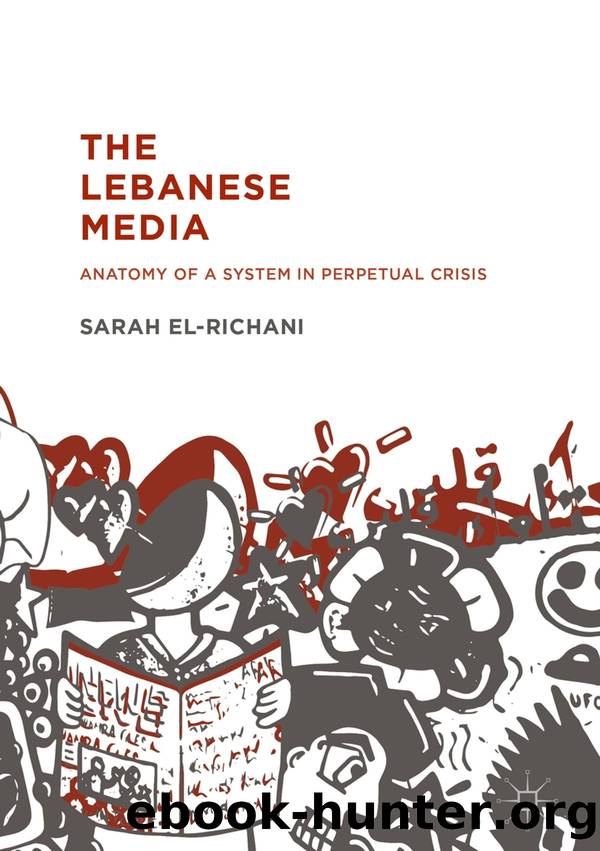The Lebanese Media: Anatomy of a System in Perpetual Crisis by Sarah El-Richani

Author:Sarah El-Richani
Language: eng
Format: mobi
Tags: Language Arts & Disciplines, Regional Studies, Sociology, Social Science, Communication Studies, General, Anthropology, Cultural & Social, Social History, Media Studies, History
ISBN: 9781137601834
Publisher: Springer
Published: 2016-12-23T21:00:00+00:00
CHAPTER 4
Moving Beyond: Amended Dimensions, Salient FactorsâAn Emerging Model
Amended dimensions
Hallin and Manciniâs models are not, nor claim to be, universal. Instead, they attempt to categorize the media systems in the âWestâ. What then for the rest of the worldâs media systems? Despite calls to remodel and adapt, some researchers have attempted to âfitâ their media systems under one of the three models. In particular, the Polarized Pluralist Model with its low circulation rates, influential state role, high political parallelism and low professionalization has appealed to many researchers, prompting Barbie Zelizer to label it âdustbin of the worldâ (as cited in El-Richani 2012, p. 3). Hallin himself has suggested that though many considerations may come into play in âotherâ contexts, most of the worldâs media systems may fall between the Mediterranean/Polarized Pluralist and the Liberal Model.1 Indeed, a myriad of publications particularly on Central and Eastern Europe have referred to the âItalianizationâ of the media in those nations (Wyka 2008). The media systems of Central and Eastern Europe have also been described as âthe Liberal Model mixed with the Polarized Pluralist Modelâ (Skolkay 2008, pp. 37â38). Similarly, Boguslawa DobekOstrowska, in Hallin and Manciniâs follow-up edited volume, agrees that while the media systems in the region could have been categorized under the Polarized Pluralist Model, they currently lie between the two aforementioned types (Hallin and Mancini 2012; Hallin and Mancini 2004, pp. 26â50). Elena Vartanova, meanwhile, contends that although the Russian media system also shares several characteristics with the Polarized
© The Author(s) 2016 173 S. El-Richani, The Lebanese Media,
DOI 10.1057/978-1-137-60183-4_4
Pluralist Model and some of the Liberal Modelâs features, this unique Eurasian model, as de Smaele labeled it (1999, p. 174), can be described as âstatist commercializedâ (2011). According to Vartanova, this is because in addition to the paternal character of the media-state relationship, growing commercialization has to some degree challenged the stateâs influence (2011, pp. 141â142). The Baltic countriesâ media systems, on the other hand, are structured along the lines of yet another hybrid-liberal corporatism (BalÄytienÄ 2009, pp. 41â42). While the stateâs role in the media systems in Estonia, Lithuania and Latvia is limited, with ownership regulation deemed as liberal, consensus among societal groups in mediaregulating institutions is also sought (Ibid.).
Meanwhile, similar studies from other parts of the world also critically assess the sets of variables as well as the models. Although a study on the Egyptian transformation media system acknowledges an âoverlapâ with some features of the Polarized Pluralist Model and appreciates the normative value of the three models, the work concludes that the Egyptian media system is in fact divergent (Khamis 2008, p. 274). The researcher also astutely calls for caution in applying the models and for adapting the model to the local context (Ibid.). Similarly, a chapter on the Brazilian media system in Hallin and Manciniâs edited sequel also disagrees with previous studies classifying Brazil as part of the Polarized Pluralist category and points to important differences such as the systems of government (de Albuquerque 2012, pp. 93â94).
Indeed, the
Download
This site does not store any files on its server. We only index and link to content provided by other sites. Please contact the content providers to delete copyright contents if any and email us, we'll remove relevant links or contents immediately.
| Anthropology | Archaeology |
| Philosophy | Politics & Government |
| Social Sciences | Sociology |
| Women's Studies |
Cecilia; Or, Memoirs of an Heiress — Volume 1 by Fanny Burney(32548)
Cecilia; Or, Memoirs of an Heiress — Volume 2 by Fanny Burney(31947)
Cecilia; Or, Memoirs of an Heiress — Volume 3 by Fanny Burney(31932)
The Great Music City by Andrea Baker(31917)
We're Going to Need More Wine by Gabrielle Union(19034)
All the Missing Girls by Megan Miranda(15960)
Pimp by Iceberg Slim(14488)
Bombshells: Glamour Girls of a Lifetime by Sullivan Steve(14058)
For the Love of Europe by Rick Steves(13928)
Talking to Strangers by Malcolm Gladwell(13350)
Norse Mythology by Gaiman Neil(13349)
Fifty Shades Freed by E L James(13233)
Mindhunter: Inside the FBI's Elite Serial Crime Unit by John E. Douglas & Mark Olshaker(9324)
Crazy Rich Asians by Kevin Kwan(9279)
The Lost Art of Listening by Michael P. Nichols(7494)
Enlightenment Now: The Case for Reason, Science, Humanism, and Progress by Steven Pinker(7306)
The Four Agreements by Don Miguel Ruiz(6745)
Bad Blood by John Carreyrou(6611)
Weapons of Math Destruction by Cathy O'Neil(6267)
